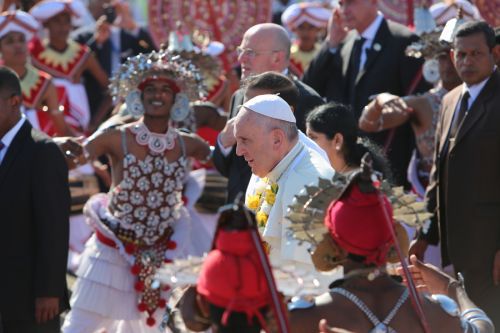Pope Francis has begun his visit to Sri Lanka, voicing hopes for “days of friendship, dialogue and solidarity.” “It is my hope that Sri Lanka’s political, religious and cultural leaders, by measuring their every word and action by the good and the healing it will bring, will make a lasting contribution to the material and spiritual progress of the Sri Lankan people,” the Pope said during a welcoming ceremony at the Bandaranaike International Airport on the morning of Jan. 13. The Holy Father was greeted by the newly-elected Sri Lankan President Maithripala Sirisena, Cardinal Malcolm Ranjith of Columbo, and other officials. The ceremony included traditional Sri Lankan songs and dances. In his opening remarks at the ceremony, Pope Francis said that Sri Lanka’s “natural beauty” has made it known as “the Pearl of the Indian Ocean.” “Even more importantly, this island is known for the warmth of its people and the rich diversity of their cultural and religious traditions,” he continued. He said he was visiting for pastoral reasons: to help a country ravaged by civil war for a quarter century rebuild and regain peace. “It is no easy task to overcome the bitter legacy of injustices, hostility and mistrust left by the conflict. It can only be done by overcoming evil with good and by cultivating those virtues which foster reconciliation, solidarity and peace,” the Pope said. Although Sri Lanka is a mostly Buddhist country, with Christians accounting for just eight percent of its 20.4 million people, Pope Francis is the third Pope to visit the country. Pope Paul VI made a visit in 1970, and Pope St. John Paul II visited exactly 20 years ago in 1995. Pope John Paul II tried to establish interfaith connections in the country during his visit, but was boycotted by the nation’s Buddhist leaders. In his remarks at the welcoming ceremony, Pope Francis said the process of healing and rebuilding is the duty of everyone, with an “essential role” for the followers of all religious traditions. “Most importantly, they must be prepared to accept one another, to respect legitimate diversities, and learn to live as one family,” he said. “Whenever people listen to one another humbly and openly, their shared values and aspirations become all the more apparent. Diversity is no longer seen as a threat, but as a source of enrichment.” Pope Francis’ visit is expected to bridge divides between the Tamil minority and Sinhalese majority populations, who had been at war for a quarter of a century before the fighting ended in 2009. Rebuilding efforts should not only focus on infrastructure and material needs, Pope Francis said, but also on the dignity of each person in the country. “In this sense, the great work of rebuilding must embrace improving infrastructures and meeting material needs, but also, and even more importantly, promoting human dignity, respect for human rights, and the full inclusion of each member of society,” he said. On the Pope’s schedule is a visit to the shrine of Our Lady of the Rosary in the Tamil region of the country, where he will greet the faithful and pray. The visit could send a strong message of peace and solidarity for the country, the Associated Press reports. After the ceremony, the Pope’s schedule for the day included an interreligious encounter in the Bandaranaike Memorial International Conference Hall, which is expected to include two moderate Buddhist leaders. Pope Francis is also expected to canonize Blessed Joseph Vaz on the morning of Jan. 14th in Colombo. Blessed Joseph, who was a priest in Sri Lanka during the mid-1600s, often had to disguise himself as a priest in order to carry out his ministry due to the strong Calvinist presence in the country at the time. After his Sri Lankan visit, the Pope will fly to the Philippines, where he will visit through Jan. 19. In stark contrast to Sri Lanka, 86 percent of the Philippines’ 93.4 million people identify as Catholic. While the country has not known as much political unrest as Sri Lanka recently, the Philippines has been ravaged by several typhoons, earthquakes and other natural disasters in recent years.

